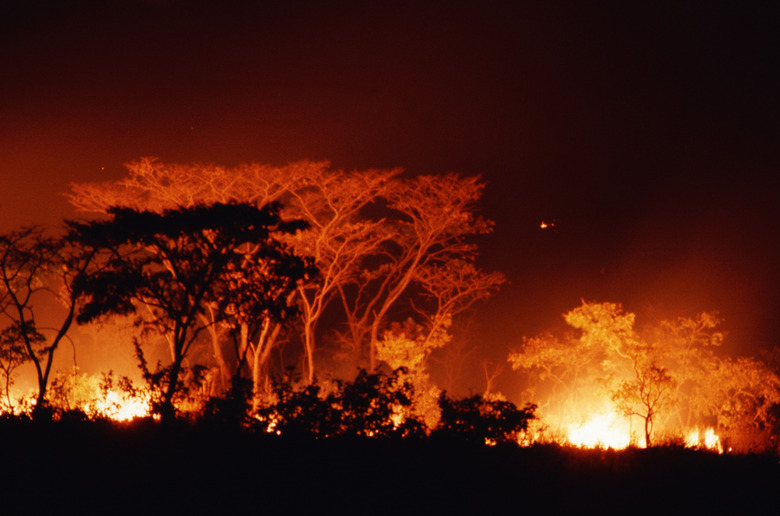What Would Happen If A Forest Fire Destroyed An Ecosystem?
Forest fires are a natural phenomenon, and forests have evolved to deal with them. Destructive as forest fires may seem, forests often regrow in their wake. In some cases, however, forest fires become so intense they cause severe damage to the soil that may take years or even decades to repair.
Regrowth Process
Regrowth Process
Pioneer species are the first to move in and recolonize the alien landscape of a forest after a fire. Often these hardy plants have special adaptations that make them well-suited to compete in the post-fire environment. Blanket flower, for example, has seeds that can germinate and take root after a fire and remain viable in the soil for as long as two years. As pioneer species grow, they create the conditions needed for the species from the original forest to return. In some Canadian forests after fires, for example, aspens are among the first trees to return, and black spruce trees from the original forest can take root in their shade. Eventually these original species crowd out the pioneers and take their place. As the original species become dominant, they create a forest similar to the one that existed before the fire. Accumulating needles and debris provide the fuel needed for another fire and the cycle repeats itself again.
Severe Fires
Severe Fires
In some cases, forest fires burn so hot and become so intense they cause serious damage to the soil, altering it in ways that could prevent recovery for years or even decades. Accumulated debris is a major risk factor for these severe fires. If the layer of litter and debris on a forest floor before the fire is very thick, the fire may move slowly and reach very high temperatures. That's one reason why periodic small fires are important to the health of many forest ecosystems: they prevent the buildup of litter and debris that might lead to a far more destructive mega-fire later on.
Hydrophobic Soil
Hydrophobic Soil
High-temperature fires may cause soils to become water-repelling or hydrophobic by vaporizing hydrophobic compounds that recondense on soil particles, coating them with a water-repelling layer. Once the soil is hydrophobic it soaks up a lot less water, making it more difficult for plants to take root and leaving the post-fire landscape extremely vulnerable to erosion. Erosion carries away valuable topsoil and chokes up streams and waterways, making it more difficult for pioneer species to colonize the land. Ash from the fire makes the problem even worse, choking pores in the soil so water cannot penetrate. Soil after a severe fire may remain hydrophobic for months or even years after the fire, although the particles typically lose their hydrophobic coating within six years or less.
Soil Sterilization
Soil Sterilization
Soil sterilization occurs where a hot and slow-moving fire destroys soil fungi and microbes. The bacteria and fungi in soil play a critical role in providing nutrients for the plants that live there. Soil sterilization can delay forest recovery for many years after the fire. Sometimes, it takes as many as 12 years for soil microbe activity to reach pre-fire levels. Intense forest fires also reduce the amount of available nitrogen in the soil, making it more difficult for plants and microbes to re-colonize. The higher the temperature of the fire, the more severe this effect becomes.
Invasion
Invasion
Hardy invasive species may colonize the post-fire landscape, then prevent the return of the original native species. Scotch broom, for example, is an invasive species that has colonized areas of the Sierra Nevadas after wildfires so effectively that the original species were unable to make a comeback. In cases like this, the original ecosystem may never be restored, because a new ecosystem centered on non-native invasive species has taken its place.
References
- NASA Earth Observatory: Evolving in the Presence of Fire
- USDA Forest Service: Effects on Species of Concern
- Pacific Biodiversity Institute: Forest Fire Ecology
- Hydrological Processes: Strength and Persistence of Fire-Induced Soil Hydrophobicity under Ponderosa and Lodgepole Pine, Colorado Front Range
- Proceedings: Workshop on Fire, People and the Central Hardwoods Landscape: Effects of Fire on the Ecology of the Forest Floor and Soil of Central Hardwood Forests
- Oecologia: Effects of Fire on Properties of Forest Soils: A Review
- Sierra Forest Legacy: Invasive Species
Cite This Article
MLA
Brennan, John. "What Would Happen If A Forest Fire Destroyed An Ecosystem?" sciencing.com, https://www.sciencing.com/would-happen-forest-fire-destroyed-ecosystem-23397/. 24 April 2017.
APA
Brennan, John. (2017, April 24). What Would Happen If A Forest Fire Destroyed An Ecosystem?. sciencing.com. Retrieved from https://www.sciencing.com/would-happen-forest-fire-destroyed-ecosystem-23397/
Chicago
Brennan, John. What Would Happen If A Forest Fire Destroyed An Ecosystem? last modified March 24, 2022. https://www.sciencing.com/would-happen-forest-fire-destroyed-ecosystem-23397/
